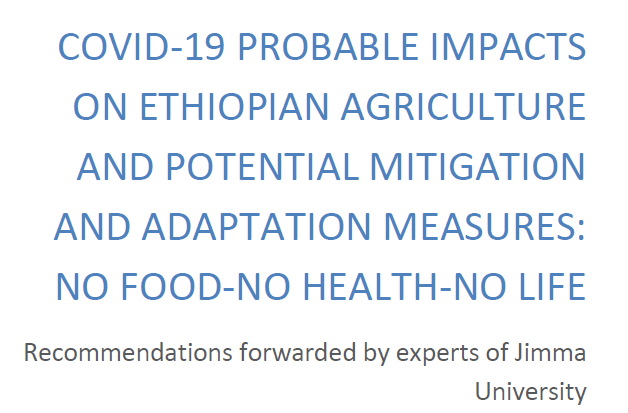The COVID-19 pandemic outbreak is said to bring impact on the various sectors of the economy across the globe. Anticipating and mitigating the possible disruptions the pandemic may trigger is an issue at stake. Scholars in various disciplines are conducting expert analysis on the probable impacts of the global pandemic in various sectors, and are putting forward the mitigation/adaptation strategies. From the time the pandemic was announced in Ethiopia, Jimma University has been exerting efforts to contribute towards the prevention of the spread of the virus, and the coping mechanisms with the probable impacts from the outbreak on different sectors. As part of these initiatives, JU’s experts have conducted a timely expert analysis on the probable impacts of COVID-19 on the Ethiopian Agriculture and the Mitigation/Adaptation measures to be taken.
A group of scholars from College of Agriculture and Veterinary Medicine (JUCAVM) of Jimma University made a synthesis on the probable impacts of COVID-19 on Ethiopian agriculture and potential mitigation/ adaptation measures. This synthesis aims at identifying the major challenges that could be faced by the agricultural sector due to the outbreak of the pandemic and suggesting the coping mechanisms to abate related negative consequences. The document entitled “COVID-19 Probable Impacts on Ethiopian Agriculture and Potential Mitigation and Adaptation Measures” is a rapid review of the existing body of literature in the field added with expertise opinion of the team, which is composed of renowned professors of several sub-fields of agriculture at the college.
The major functions and stages of food supply chain such as production, handling and storage, processing and packaging, distribution and marketing, and consumption were considered as core themes during the extraction and analysis of the information gathered for the synthesis in line of which mitigation strategies are suggested on the basis of the findings obtained.
The scholars asserted that measures taken to fight COVID-19 and its further expansion could divert attention from the agriculture sector and adversely affect the food and nutrition security of the country by disrupting the food supply chains.
They, among others recommended timely delivery of agricultural inputs with affordable prices to minimize disruptions of farm input supply and agricultural extension support system to focus on family extension in the short term and Information Technology based extension system in the long term.
Community mobilization and using appropriate post-harvest technologies are also suggested as the main intervention mechanisms to minimize quantitative and qualitative post-harvest food loss and waste. According to the scholars, processing and packing should be accompanied with the availability of raw materials and labor, enhanced storage and distribution capacity, diversified product and market, and putting in place quality control and monitoring systems. Supporting value chain actors to function properly, opening new market places, controlling and monitoring prices are raised as important measures to strengthen distribution and marketing. Encouraging the consumers on the safe consumption of high-value foods, organizing cash for work for low income laborers, and providing food for vulnerable community are also suggested.
The key message drawn from the overall assessment is planned to be suggested to relevant government bodies and stakeholders to inform the decision-making process of managing the agricultural sector at this time of pandemic crisis.
To read the complete document please use the following link:
https://www.ju.edu.et/sites/default/files/Covid19%20impact%20on%20Eth%20Agri%20and%20mitigation%2023.04.20_final.pdf

